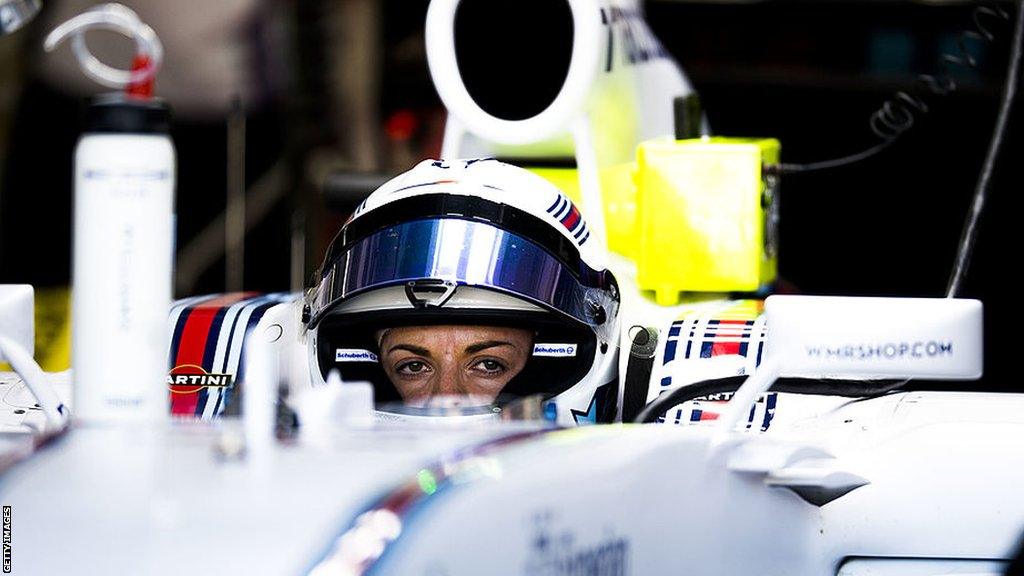F1 Academy: Susie Wolff says new series will increase female talent pool and 'open door to F1'
- Published

At the British Grand Prix in 2014, Susie Wolff became the first women to take part in a Formula 1 weekend since Giovanna Amati in 1992 when she drove in a practice session for Williams
Susie Wolff was looking at starting a career outside motorsport until Formula 1 chairman Stefano Domenicali approached her about running the new Academy aimed at creating a pathway for women to the top of the sport.
Wolff has spent a career trying to prove that women are able to race at the very highest level of motorsport, and to help create ways to make that possible.
She believes the new series can, as she puts it, "create a destination where young girls can see a route, an affordable route" to start their journey towards the top.
Taking charge of it, Wolff says, was too good an opportunity to miss. "In the end," she says, "it was something I had to do and really wanted to do."
The Academy is an entry-level category that launches this year to give young women a foothold on the first step of the motorsport ladder as they progress out of karting.
F1 will fund half the nearly £300,000 budget for each competitor, with drivers having to find the rest themselves.
Wolff says: "That jump from karting to single-seaters, if you don't have the financial means to do it from your environment, is a huge jump, and I have been through that and it was incredibly tough.
"F1 Academy becomes a focal point for what girls are aiming for.
"And with where I see the possibilities of the championship, it will give them a certain platform to try and progress further up the ladder, because it will give them visibility, it will give them support in every area, not just on track, to allow them to have the confidence to keep going up the ladder.
"We will make sure the winner is supported to go on to success. It won't be that they just win and that is job done."
Wolff, who rose through the ranks to race against men in the DTM German Touring Car Championship and become Williams F1 test driver, is under no illusions. She knows that there will be no overnight fix to the lack of representation of women in F1.
"We have to manage expectations," she says, "because when you when you talk about getting a woman into F1, I know how tough it is to get to F1, to be competitive in F1.
"It is going to take a long time, of that I have no doubt, and I am well aware of the challenges ahead.
"But I also think there are a lot of F1 teams looking at talent. If you look at Ferrari's support of the [FIA] rising stars programme. There is a willingness among the teams in the paddock to look for talent in the future.
"This is not tokenism, and it's not expecting to open doors for those who are there but not quite good enough. I am well aware we need to increase the talent pool for the best to rise up and only then will we be able to open the door to F1."
Abbi Pulling is regarded as one of the UK's best hopes to find a female F1 driver
For Wolff, one of the big causal factors behind the lack of female representation at the top of motorsport is the lack of representation of women in F1, and therefore the small number of role models for girls to look up to.
"It's about more than just 15 girls going racing," Wolff says. "This sport is seen as very inaccessible.
"I saw a terrifying quote that if you look at [Netflix's] Drive to Survive, I think it's 1.8% of screen time features a female. How should a young girl, who's eight, and maybe loves F1, how can she visualise herself getting into that paddock if she can't even see participation or women working in the paddock?
"There are successful women in the paddock [but] it seems so far away for these young girls. They watch Drive To Survive or switch on an F1 race but it's so far away for them to even imagine getting into this sport.
"We can quite quickly create change that they believe in. They can think maybe there's a chance for me.
"In the short term where we can have a positive impact is because we have the might of F1 behind us and the global network of F1.
"Then the change to get a woman in this paddock is going to take much longer. But if nobody does anything, nothing is going to change, it's just going to take much longer to move the needle."
For a series aiming to promote the idea of women starting on the pathway to F1, the Academy as it has been set up this year has one obvious flaw - of its seven rounds, only the final one is at a grand prix, at the US race in Austin, Texas in October.
But this is a situation Wolff, who was only appointed this week, has inherited. And F1 says it is looking to incorporate more events into the F1 schedule in the future.
The calendar was announced in February and racing will begin in Austria on 28 April.
The series will use the same cars as those used in Formula 4, an entry-level series for drivers taking their first steps in car racing.
Can women compete against men in F1?
In F1, most people are working on the assumption that women can compete against men on a level playing field.
Wolff points to her own experience - and that of former world rally driver Michele Mouton - to reject the idea that it might turn out one day, once more evidence is amassed, that perhaps F1 is an environment where women can't compete equally, just as is the case in many sports.
"I get the argument as to why the sport should maybe look at segregation," she sys.
"What for me is difficult with that argument - and this is where Michele Mouton and I were always aligned - I stood on a Formula Renault podium with Lewis Hamilton when I was 21.
"I raced against the best. And I was never on Lewis's level, but I had that degree of success. I raced in DTM. I got picked up by one of the best car manufacturers in the world. I made it into F1 as a test driver.
"So it is very difficult for me based on my experiences - for example finishing 15th in the world karting championships out of a field of 137 - to turn around now and say maybe it should be segregated.
"Because I had a certain amount of success through every category, and by no means was I the best or most talented, but I still found my way and that was coming from a family which didn't have huge financial means.
"The three sports where women do compete with men are sailing, where there is a big boat involved, horse riding, jumping a big animal, and it's motorsport, where there is a car.
"You are not talking about only the muscle make-up of the athlete. If you look at men and women's football, they can't be mixed, because women can't run as fast as men. Whereas in motorsport it doesn't come down to just muscle.
"If you look at Lando Norris, or Sebastian Vettel, they are very strong in the right areas, but being bigger or more muscular in motorsport isn't a clear advantage. If anything, drivers want to be small and compact. It's definitely not down to only physical contributors."
In other words, do the achievements of Wolff and Mouton prove that if the talent pool is widened it's only a matter of time before a woman emerges who can compete a the highest level in F1?
"Is my opinion, yes," Wolff says. "Definitely."

Was it a mistake to sell off British Gas? Find out if the privatisation of the company could have had an impact on today's energy price crisis
Scarlett Moffatt has opened her driving school! Can she help struggling learners pass their test?

